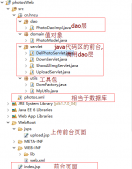基于socket通信,spring也有自己的socket通信服務(wù):websocket,這次就介紹如何在spring項(xiàng)目中使用websocket進(jìn)行通信交互。
后臺(tái):spring boot;前臺(tái):angularjs
后臺(tái)建立服務(wù)
首先我們先建立起后臺(tái)的服務(wù),以實(shí)現(xiàn)進(jìn)行socket連接。
1.引入websocket依賴(lài)
建立好一個(gè)maven項(xiàng)目之后,我們需要在xml中引入websocket的相關(guān) 依賴(lài):
|
1
2
3
4
5
6
7
8
9
10
11
12
13
14
15
16
17
18
19
20
21
22
23
24
25
26
27
28
29
30
31
32
|
<dependencies> <!--websocket--> <dependency> <groupid>org.springframework.boot</groupid> <artifactid>spring-boot-starter-websocket</artifactid> </dependency> <dependency> <groupid>org.webjars</groupid> <artifactid>webjars-locator-core</artifactid> </dependency> <dependency> <groupid>org.webjars</groupid> <artifactid>sockjs-client</artifactid> <version>1.0.2</version> </dependency> <dependency> <groupid>org.webjars</groupid> <artifactid>stomp-websocket</artifactid> <version>2.3.3</version> </dependency> <dependency> <groupid>org.webjars</groupid> <artifactid>bootstrap</artifactid> <version>3.3.7</version> </dependency> <dependency> <groupid>org.webjars</groupid> <artifactid>jquery</artifactid> <version>3.1.0</version> </dependency></dependencies> |
2.配置類(lèi)
引入依賴(lài)后,就需要我們進(jìn)行配置類(lèi)的編寫(xiě):
|
1
|
public class websocketconfig {} |
這個(gè)類(lèi)需要實(shí)現(xiàn)一個(gè)接口,來(lái)幫助我們進(jìn)行socket的連接,并接受發(fā)送過(guò)來(lái)的消息。比如下面這樣:
|
1
2
3
4
5
6
7
8
9
10
11
12
13
14
15
16
17
18
19
20
21
22
23
24
25
26
|
package com.mengyunzhi.springmvcstudy.config;import org.springframework.context.annotation.configuration;import org.springframework.messaging.simp.config.messagebrokerregistry;import org.springframework.web.socket.config.annotation.enablewebsocketmessagebroker;import org.springframework.web.socket.config.annotation.stompendpointregistry;import org.springframework.web.socket.config.annotation.websocketmessagebrokerconfigurer;@configuration@enablewebsocketmessagebrokerpublic class websocketconfig implements websocketmessagebrokerconfigurer { @override public void configuremessagebroker(messagebrokerregistry config) { config.enablesimplebroker("/topic"); config.setapplicationdestinationprefixes("/server"); } @override public void registerstompendpoints(stompendpointregistry registry) { //注冊(cè)stomp協(xié)議節(jié)點(diǎn),同時(shí)指定使用sockjs協(xié)議 registry .addendpoint("/websocket-server") .setallowedorigins("*") .withsockjs(); }} |
通常的配置我就不在這里解釋了,值得一提的是,我們使用了@enablewebsocketmessagebroker這個(gè)注解,從字面上我們不難猜出,它表示支持websocket提供的消息代理。
然后我們實(shí)現(xiàn)configuremessagebroker()方法,來(lái)配置消息代理。在這個(gè)方法中,我們先調(diào)用enablesimplebroker()來(lái)創(chuàng)建一個(gè)基于內(nèi)存的消息代理,他表示以/topic為前綴的消息將發(fā)送回客戶(hù)端。接著設(shè)置一個(gè)請(qǐng)求路由前綴,它綁定了@messagemapping(這個(gè)后面會(huì)用到)注解,表示以/server為前綴的消息,會(huì)發(fā)送到服務(wù)器端。
最后實(shí)現(xiàn)了registerstompendpoints()方法,用來(lái)注冊(cè)/websocket-server端點(diǎn)來(lái)建立服務(wù)器。
3.控制器
這時(shí)我們要建立一個(gè)供前臺(tái)訪(fǎng)問(wèn)的接口來(lái)發(fā)送消息。
|
1
2
3
4
5
6
|
@messagemapping("/hello")@sendto("/topic/greetings")public greeting greeting(hellomessage message) throws exception { thread.sleep(1000); // simulated delay return new greeting("hello, " + htmlutils.htmlescape(message.getname()) + "!");} |
其中@messagemapping注解就是我們前面提到的,前臺(tái)會(huì)將消息發(fā)送到/server/hello這里。
然后還有一個(gè)@sendto注解,它表示服務(wù)器返回給前臺(tái)的消息,會(huì)發(fā)送到/topic/greeting這里。
前臺(tái)客戶(hù)端
服務(wù)器部分建立好后,接著我們就要去建立客戶(hù)端部分
1.客戶(hù)端界面
|
1
2
3
4
5
6
7
8
9
10
11
12
13
14
15
16
17
18
19
20
21
22
23
24
25
26
27
28
29
30
31
32
33
34
35
36
37
38
39
40
41
42
43
44
45
46
47
48
49
50
51
52
53
|
<!doctype html><html><head> <title>hello websocket</title> <link href="/webjars/bootstrap/css/bootstrap.min.css" rel="external nofollow" rel="stylesheet"> <link href="/main.css" rel="external nofollow" rel="stylesheet"> <script src="/webjars/jquery/jquery.min.js"></script> <script src="/webjars/sockjs-client/sockjs.min.js"></script> <script src="/webjars/stomp-websocket/stomp.min.js"></script> <script src="/app.js"></script></head><body><noscript><h2 style="color: #ff0000">seems your browser doesn't support javascript! websocket relies on javascript being enabled. please enable javascript and reload this page!</h2></noscript><div id="main-content" class="container"> <div class="row"> <div class="col-md-6"> <form class="form-inline"> <div class="form-group"> <label for="connect">websocket connection:</label> <button id="connect" class="btn btn-default" type="submit">connect</button> <button id="disconnect" class="btn btn-default" type="submit" disabled="disabled">disconnect </button> </div> </form> </div> <div class="col-md-6"> <form class="form-inline"> <div class="form-group"> <label for="name">what is your name?</label> <input type="text" id="name" class="form-control" placeholder="your name here..."> </div> <button id="send" class="btn btn-default" type="submit">send</button> </form> </div> </div> <div class="row"> <div class="col-md-12"> <table id="conversation" class="table table-striped"> <thead> <tr> <th>greetings</th> </tr> </thead> <tbody id="greetings"> </tbody> </table> </div> </div></div></body></html> |
這部分沒(méi)什么說(shuō)的,主要就是其中引的連個(gè)js文件:
|
1
2
|
<script src="/webjars/sockjs-client/sockjs.min.js"></script><script src="/webjars/stomp-websocket/stomp.min.js"></script> |
這兩個(gè)文件幫助我們利用sockjs和stomp實(shí)現(xiàn)客戶(hù)端。
創(chuàng)建邏輯
|
1
2
3
4
5
6
7
8
9
10
11
12
13
14
15
16
17
18
19
20
21
22
23
24
25
26
27
28
29
30
31
32
33
34
35
36
37
38
39
40
41
42
43
44
45
46
47
48
49
50
|
var stompclient = null;function setconnected(connected) { $("#connect").prop("disabled", connected); $("#disconnect").prop("disabled", !connected); if (connected) { $("#conversation").show(); } else { $("#conversation").hide(); } $("#greetings").html("");}function connect() { var socket = new sockjs('/websocket-server'); stompclient = stomp.over(socket); stompclient.connect({}, function (frame) { setconnected(true); console.log('connected: ' + frame); stompclient.subscribe('/topic/greetings', function (greeting) { showgreeting(json.parse(greeting.body).content); }); });}function disconnect() { if (stompclient !== null) { stompclient.disconnect(); } setconnected(false); console.log("disconnected");}function sendname() { stompclient.send("/server/hello", {}, json.stringify({'name': $("#name").val()}));}function showgreeting(message) { $("#greetings").append("<tr><td>" + message + "</td></tr>");}$(function () { $("form").on('submit', function (e) { e.preventdefault(); }); $( "#connect" ).click(function() { connect(); }); $( "#disconnect" ).click(function() { disconnect(); }); $( "#send" ).click(function() { sendname(); });}); |
這個(gè)文件主要注意connect()和sendname()這兩個(gè)方法。
最后實(shí)現(xiàn)的效果如下:

官方文檔:
https://spring.io/guides/gs/messaging-stomp-websocket/
https://docs.spring.io/spring/docs/4.3.20.release/spring-framework-reference/htmlsingle/#websocket
以上就是本文的全部?jī)?nèi)容,希望對(duì)大家的學(xué)習(xí)有所幫助,也希望大家多多支持服務(wù)器之家。
原文鏈接:https://segmentfault.com/a/1190000016976733














